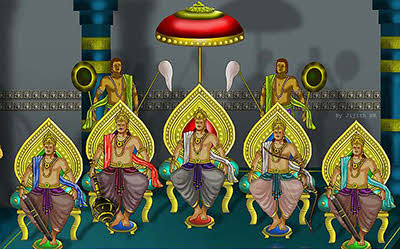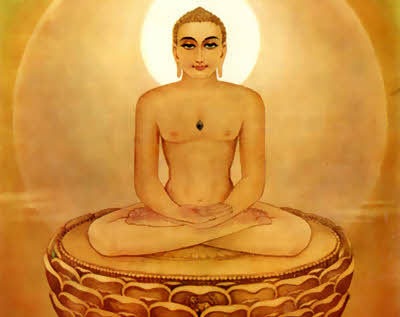
In the continent Jambudvipa, in the East Videhas, in the province Puskalavati in the vicinity of the Ocean, in the city Pundarikini, they were born in succession as the five sons of King Vajrasena by his wife Dharini. Among them the soul of the doctor was the first son, named Vajranabha, indicated by fourteen great dreams. The soul of the prince was the second, named Bahu. The minister’s son was named Subahu. The Souls of the sons of the merchant and trader were named Pitha and Mahapitha; and the soul of Kesava became a Rajput, Suyasas. Suyasas was devoted to Vajranabha even from childhood. Affection resulting from a former birth binds friendship. The King’s sons and Suyasas gradually grew up, resembling the six mountain-ranges turned into men. Often riding horse back on the bridle path, they, powerful, gave the impression of Revanta multiplied. In the study of the arts their teacher in the arts was only a witness, since the merits of the great become apparent by themselves. Their exhibitions of strength were excelled by no one, as they lifted mountains with their arms just as if lifting stones.
Then the Lokantika gods appeared before the King and announced to Vajrasena, “O Master, found your congregation.” Then Vajrasena installed on the throne Vajranabha, whose strength was equal to the thunderbolt, who was like a second himself embodied. Then King Vajrasena delighted the earth by distributing gifts for a year, like a cloud water. His festival of departure (niskramana) was made by gods, asuras, and kings. He adorned the garden to which he went like the moon the sky. The Blessed One, having self-acquired knowledge, took initiation there, and the knowledge called manahparyava was acquired. Rejoicing in the supreme spirit, having a wealth of tranquility, free from affection, free from possessions, with various resolutions the Lord set out to wander over the earth.
Vajranabha gave provinces to each one of his brothers and, surrounded by them in constant attendance, looked like Indra surrounded by Lokapalas. Suyasas was his charioteer, like Arunas of the Sun. For great warriors must choose charioteers in accordance with themselves. From the destruction of the impurity of the ghatikarmas of Vajrasena, he acquired the highest omniscience like the light of a mirror. Then the cakra, surpassing the sun, entered King Vajranabha’s armory. The thirteen other jewels also belonged to him. For acquisition is in proportion to merit, as a lotus is in proportion to the water. The nine treasures performed service to him, drawn by strong merit like bees by perfume. He conquered the entire province Puskalavati, and all the kings consecrated him as cakravartin. His inclination toward Dharma, even as he was enjoying pleasures, increased very much, as if in rivalry with increasing age. Gradually from the increasing wealth of disgust with existence, his inclination toward Dharma became very strong like a creeper from water in a basin at its root.

One day the Lord of Jinas, Vajrasena, came there in his wandering, producing the greatest joy like moksa embodied. Then the Master delivered a sermon on Dharma, which was a fountain of nectar for the ears, under the caitya-tree in the samavasarana. Joyfully, like a king-goose Vajranabha with his brothers approached the lotus-feet of the Lord Jinas, kinsman of the whole world. After he had circumambulated three times the Lord of the World and bowed to him, he sat down behind Dharmacakri like a younger brother. Chief of the laymen, he listened to the sermon which resembled rain at the time of Svati, producing the pearl of enlightenment in the pearl-oysters of the minds of the Souls capable of emancipation.
Listening eagerly to the Blessed One’s speech like a deer to a song, joyfully the King thought: “The boundless Ocean of existence is hard to cross, like the sea. Fortunately, my Father, Lord of the World, is a guide across even it. Delusion makes men completely blind, just as darkness does. The Blessed One destroys delusion completely, as the sun destroys darkness. The heap of karma is incurable like a powerful disease that has existed for a long time. My father is its healer. But what need to say more? He alone is the destroyer of all pain, the sole producer of happiness, an Ocean of nectar of compassion. Since the Master is like that, alas! through negligence arising from delusion, we’ ourselves have deceived ourselves for so long a time.” Then in a voice choked from devotion, the Cakravartin announced to the Cakravartin of Dharma who had come: “For a long time my mind has been injured by books on statecraft devoted to the acquisition of wealth, just as a ploughed field is injured by kusa grass. In the same way, desiring worldly pleasures, like an actor I have long made my soul play parts always with karma as a costume. For this sovereignty of mine is dependent on wealth and love. Whatever Dharma is considered here is allied with evil. Even though I am my Father’s son, if I wander here in the Ocean of existence, what deeds of prowess would I, just like everyone else, have to my credit? Just as I have taken care of this kingdom I received from you, so I will take care of the empire of selfcontrol. Give it to me.”
After he had made the kingdom subject to his son, the Cakravartin the sun in the sky of his own family took the vow under the Blessed One. His brothers, Bahu and the rest, took the vow at that time. For what their father and elder brother had taken came to them by inheritance. The charioteer, Suyasas, following his master, became a mendicant at the feet of the charioteer of Dharma. For servants follow their masters. Vajranabha instantly became completely acquainted with the Ocean of scriptures, just as if the twelve angas visible to the eye had become combined in one living body. Bahu and the others were learned in eleven angas. For the wealth of merit is varied in accordance with the variation in destruction (ksaya) and subsidence (upasama) of karma. Although rich in contentment, they were never satisfied with service at the Tirthankara’s feet and with severe penance. Constantly drinking the nectar of the Tirthankara’s speech, they did not become emaciated even with penance, such as a month’s fast, etc. The Blessed One, Vajrasena, resorted to the last pure meditation* and attained emancipation which was celebrated with a great festival by the gods.











No comments yet.
Leave a comment